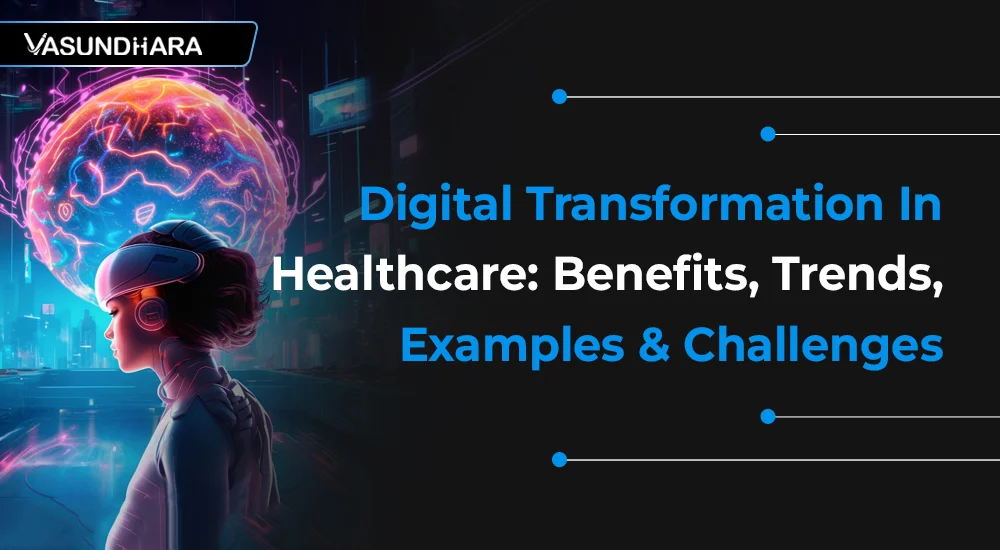Digital Transformation In Healthcare: Benefits, Trends, Examples & Challenges


- Jun 6, 2023




Digital transformation is impacting consumer experience and convenience across industries.
Healthcare transformation affects how doctors diagnose, monitor, and manage patients' health.
It seeks to provide the agility necessary to optimize operational processes, ensure compliance, enhance the patient experience, and reduce costs.
For example, digital transformation can eliminate 95% of adverse drug events such as dosage errors, overdoses, and allergic reactions.
Integrating digital technology into the existing healthcare environment clearly presents unique obstacles.
Nonetheless, it is clear that there are significant benefits to be gained by properly applying digital innovation in healthcare.
In this article, we will go through why is digital transformation important in healthcare, benefits of digital transformation in healthcare, and top digital transformation trends.
We will also look at a few real-world examples of healthcare digital transformation that are already being implemented by numerous providers.
Integrating digital technology into the existing healthcare environment clearly presents unique obstacles.
Nonetheless, it is clear that there are significant benefits to be gained by properly applying digital innovation in healthcare.
In this article, we will go through why is digital transformation important in healthcare, benefits of digital transformation in healthcare, and top digital transformation trends.
We will also look at a few real-world examples of healthcare digital transformation that are already being implemented by numerous providers.
Digital transformation in healthcare is the use of technology to streamline operations, improve the patient experience, and make on-demand patient care more accessible and more affordable.
The objective of digital transformation in the healthcare industry is to deliver long-term value to all of its stakeholders and patients using the most advanced tools, methodologies, and practices.
It involves incorporating technological advancements to enhance services without increasing costs.
According to a recent study, 92% of healthcare professionals and organizations have improved performance through digital transformation.
The US Healthcare market is enormous, and its digital health market is projected to grow at a CAGR of 29.6% from $86.4 billion in 2018 to $504.4 billion in 2025.
Digital healthcare technologies are inextricably linked to the future, as we have entered an era of accelerated change fueled by the most recent inventions and discoveries.
While some may use technology as a means of short-cutting, the ideal approach is to consider digital solutions as a means of enhancing the quality of care.
Here are the most significant indicators of the growing significance of digital transformation in healthcare.
Patients require increasingly personalized, high-quality healthcare services today.
With the help of digital transformation, healthcare organizations can meet these expectations for diagnosis and treatment.
The healthcare industry is one of the primary industries facing a severe shortage of trained professionals.
According to the WHO, there will be a global shortage of over 18 million qualified healthcare professionals by 2035.

Increasing administrative costs and overhead expenses force healthcare organizations to raise patient care service fees.
The digital transformation of healthcare can introduce automation and improve the organization's efficiency in order to reduce additional expenses and improve services at a lower cost.
In addition to maladies related to the COVID-19 pandemic, the global population suffers from numerous chronic diseases such as hypertension, diabetes, etc.
Such diseases necessitate monitoring, and the digital transformation can enable physicians to monitor their distant patients with such diseases.
New technologies are already having a significant impact on how healthcare is provided. Here are some of the most promising trends that are now dominating the healthcare industry to help you understand how to digitize business and improve your healthcare service.
Artificial Intelligence facilitates the lives of physicians, patients, and hospital administrators by performing human-typical tasks at a fraction of the cost and in less time.
AI offers several benefits over clinical decision-making and conventional analytics. Through interaction with training data, learning algorithms can become more precise and accurate.
It enables humans to obtain previously unattainable insights into care processes, treatment variability, patient outcomes, and diagnostics.
Consider on-demand as relieving your patient of the burden of locating a nearby hospital or clinic during an emergency.
An on-demand application on the patient's mobile phone will be their savior, as this small device is all that is required for them to receive the necessary on-demand care.
In addition to improving patient convenience, on-demand healthcare services will reduce documentation. Automatically collect information that can be accessed and transmitted via EHRs.
Extremely high utilization of on-demand healthcare services will pave the way for your care facility's digital transformation to be a tremendous success.
Big Data is revolutionizing how we analyze, leverage, and manage data across all industries.
Healthcare is one of the promising industries where artificial intelligence can be implemented to prevent preventable diseases, improve the quality of life, reduce treatment costs, and predict epidemic outbreaks.
Professionals in the healthcare industry are able to amass vast quantities of data and determine the most effective strategies for utilizing the data. Utilizing Big Data in Healthcare has the potential to save lives.
With the advent of new technologies, not only is it simpler to capture vital healthcare data, but also to transform it into actionable insights for improved patient care.
Using data-driven insights, health professionals are able to anticipate and resolve a problem before it becomes critical.

Virtual care existed prior to the development of Covid-19. However, the global lockdowns accelerated the widespread adoption of telemedicine.
During the pandemic, the use of telemedicine escalated as the technology enabled patients to manage their conditions while reducing unnecessary contact.
Telemedicine is all about accessibility and convenience; more patients, including those with disabilities and those residing in remote areas, have access to health-related care.
The scale of the global IoT market in the healthcare sector is expected to increase from $72.5 billion in 2020 to $188.2 billion in 2025.
IoT enables ubiquitous devices to monitor the health status of any individual in real-time. It has the ability to monitor vital signs and send alerts to the individual donning it and their carers.
IoT for Patients: Patients have access to personalized care through the use of devices such as fitness bracelets and wirelessly-connected heart rate monitoring cuffs.
IoT devices are used to remind users of doctor appointments, calorie count, daily step count, blood pressure, and pulse rate, among other things.IoT enables remote monitoring in real time, which is advantageous for elderly patients.
IoT for Healthcare Facilities: In hospitals, IoT devices can be utilized in many other areas besides patient monitoring.
The real-time location of medical equipment, including nebulizers, wheelchairs, and oxygen machines, is monitored using IoT devices embedded with sensors.
Additionally, hospitals must deal with the transmission of infection, which is their primary concern.
The digitization process may have accelerated in the past few years, but complete healthcare digital transformation is still a work-in-progress.
To ensure success, you need to address the following concerns:
You need to use multiple devices and applications during digitization, but unfortunately, this process can create loopholes that compromise data security.
Your patient’s data needs complete confidentiality, constant monitoring and counter-remedies.
Moreover, losing your patient’s health information can have serious consequences, such as discrimination, loss of reputation, and more.
The budgeting process in digital transformation is far better than the traditional process, as digitization offers more scale and profit as compared to the conventional approach.
While designing digital services such as applications for your patients, you must ensure that they are patient-friendly.
By understanding your target patients, you can create digital services which are easy to use by anyone.

Like other core industry sectors, the healthcare sector also witnesses resistance to transformation
The change may remain unwelcome at the initial level among paramedics and support staff.
Simply put, digital transformation is about changing the work culture and transforming the way healthcare professionals work.
The rise of the telemedicine concept has made the entire healthcare sector highly dynamic and decentralized.
In such diversified and distributed conditions, it is necessary for healthcare institutions to implement digital health strategies properly.
Also, they need to ensure that distributed workforce can easily access the patient’s data while preventing it from going into the wrong hands.
Healthcare digital transformation enables the development of systems and procedures for both patients and medical personnel that enhance the quality of healthcare services and alleviate a portion of physicians' workloads.
Let's examine the benefits in greater depth.
Hospitals deal with enormous quantities of patient data as well as extremely stringent privacy laws governing health data.
Collecting and storing patient data, insurance information, invoices, staff data, etc., requires considerable effort and time.
The digitization process creates a centralized location where all information can be stored, analyzed, and permissions can be managed to ensure legal compliance.
Modern healthcare technologies enable patients to request assistance from their mobile devices at any time.
In lieu of making an appointment and standing in line, patients can quickly connect with their physicians via social media and specialized apps to pose healthcare-related questions.
This increases the level of trust between medical staff and patients and reduces the burden for physicians.
Medical doctors frequently collaborate with other specialists to provide the most accurate diagnosis and optimal treatment plan.
In order to streamline this process and ensure accurate and expeditious diagnoses, hospitals need a functional internal communication channel.
Additionally, clinicians can contact physicians who provide care for specific patients earlier in order to discuss potential changes, reevaluate diagnoses, and offer new treatment plans or medication therapies.
| Read Related:- Ways To Implement Digital Transformation Strategy in a Business |
Despite initial expenditures, digital innovation in healthcare reduces long-term costs for hospitals and patients.
Hospitals can reduce expenses by using a data-driven approach to anticipate staffing capacity, providing assistance via apps and websites, and minimizing human errors.
Through telemedicine applications, patients have access to more affordable medical care.
By utilizing applications and connecting with healthcare professionals remotely, residents of rural and remote areas save money on transportation.

Without huge data storage, large quantities of data are lost during processing. Despite the fact that data can be stored both locally and in the cloud, the latter has gained popularity in recent years.
If hospitals do not make the effort to collect and analyze the data, they will lose out on crucial information that could aid future research.
Modern technologies are capable of preserving immense quantities of data, including raw unstructured data that can be utilized in the future.
Research, drug development, treatment development, etc., rely heavily on data, which is why preserving it is essential to enhancing the standard of medical care.
Digital transformation in the healthcare industry simplifies and optimizes the management of medical organizations, reduces unnecessary paperwork and financial resources, helps to form personnel, manage finances, and material resources.
The digitalization of the medical industry contributes to the development of telemedicine in various countries and the massive introduction of remote consultations.
Working with an app development company is essential for cutting-edge healthcare applications. Vasundhara Infotech is a top-tier mobile app development firm that offers exceptional services to help businesses succeed.
We’re ready to help any business willing to transform and innovate its healthcare business. Check out testimonials from our valued clients who achieved accelerated growth with our digital transformation solutions.
Contact us through the form on our website, and our specialists will tailor a digital transformation strategy right for you.
Copyright © 2026 Vasundhara Infotech. All Rights Reserved.